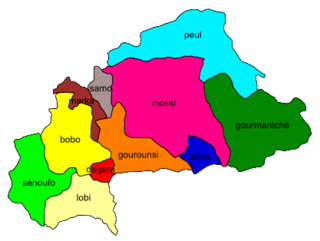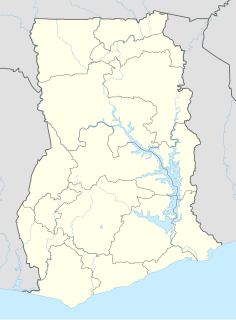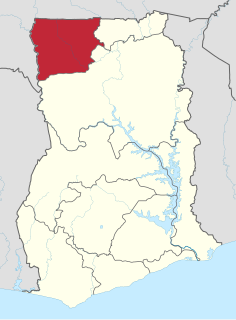
Ghana, officially the Republic of Ghana, is a country located along the Gulf of Guinea and Atlantic Ocean, in the subregion of West Africa. Spanning a land mass of 238,535 km2 (92,099 sq mi), Ghana is bordered by the Ivory Coast in the west, Burkina Faso in the north, Togo in the east and the Gulf of Guinea and Atlantic Ocean in the south. Ghana means "Warrior King" in the Soninke language.
The Dagaaba people are an ethnic group located north of the convergence of Ghana, Burkina Faso and Côte d'Ivoire. They speak the Dagaare language, a Gur language made up of the related Northern Dagaare dialects, Southern Dagaare dialects and a number of sub dialects. In northern dialects, both the language and the people are referred to as Dagara. They are related to the Birifor people and the Dagaare Diola. The language is collectively known as Dagaare, and historically some non-natives have taken this as the name of the people. One historian, describing the former usage of "Dagarti" to refer to this community by colonials, writes: "The name 'Dagarti' appears to have been coined by the first Europeans to visit the region, from the vernacular root dagaa. Correctly 'Dagari' is the name of the language, 'Dagaaba' or 'Dagara' that of the people, and 'Dagaw' or 'Dagawie' that of the land."

The balafon is a gourd-resonated xylophone, a type of struck idiophone. It is closely associated with the Mandé peoples of West Africa, particularly the Guinean branch of the Mandinka ethnic group, but is now found across West Africa from Guinea to Mali. Its common name, balafon, is likely a European coinage combining its Mandinka name bala with the word fôn 'to speak' or the Greek root phono.

The music of Togo has produced a number of internationally known popular entertainers including Bella Bellow, Akofah Akussah, Afia Mala, Itadi Bonney, Wellborn, King Mensah and Jimi Hope.

The music of Burkina Faso includes the folk music of 60 different ethnic groups. The Mossi people, centrally located around the capital, Ouagadougou, account for 40% of the population while, to the south, Gurunsi, Gurma, Dagaaba and Lobi populations, speaking Gur languages closely related to the Mossi language, extend into the coastal states. In the north and east the Fulani of the Sahel preponderate, while in the south and west the Mande languages are common; Samo, Bissa, Bobo, Senufo and Marka. Burkinabé traditional music has continued to thrive and musical output remains quite diverse. Popular music is mostly in French: Burkina Faso has yet to produce a major pan-African success.

Malidoma Patrice Somé is a West African writer and workshop leader, primarily in the field of spirituality. Born in a Dagara community in Dano, Burkina Faso, he was raised by Jesuits from the age of four. He currently lives on the West Coast of the United States.
Eremon is a relatively small community located in the Lawra Municipality in the Upper West Region of Ghana. It is about 50 kilometers north of Wa the regional capital. It is the biggest subdistrict in the entire region. The people are mainly Dagaaba and they speak an indigenous language called Dagaare.

Dagaare is the maternal language of the Dagaaba people in Ghana and Burkina Faso. It has been described as a dialect continuum that also includes Waale and Birifor.
The malimbe is a type of xylophone from the Congo which is described as having both male and female counterparts; the former has 15 wooden bars, the latter has nine. "Malimbe" also refers to a lamellaphone or mbira type instrument amongst the Nyamwezi of Tanzania.

Ikembe, is a type of musical instrument of the lamellaphone group, common amongst the Bahutu of Rwanda, Burundi and the Congo. The instrument consists of several iron lamellae, fixed to a rectangular wooden soundbox.

Burkina Faso is a multilingual country. An estimated 70 languages are spoken there, of which about 66 are indigenous. The Mossi language is spoken by about 40% of the population, mainly in the central region around the capital, Ouagadougou. French is the official language. English is very rarely spoken.

Dagara is a village situated in the Baleswar district of Odisha, in eastern India. The village, with a beach on the Bay of Bengal, is a well-known spot for local tourists. In 2006, the Government of Odisha signed a memorandum of understanding (MOU) with Chennai-based Creative Port Development Pvt Ltd. for the development of a deep-water, all-weather project, Kirtania port, at the mouth of the Subarnarekha River.

Nandom is the capital town of the Nandom District of the Upper West Region of Ghana.
The Pan-African Orchestra (PAO) is an orchestra using indigenous African traditions and instruments. It was founded as a 48-piece ensemble in 1988 in Accra, Ghana, by Nana Danso Abiam. Abiam died in a motor accident in Accra on 24 December 2014, in the early hours following his 61st birthday. His mission with the PAO, originally a 30-piece ensemble, had been to explore the classical foundations of traditional African music and to cultivate an integrated continental art form through new compositional and orchestral techniques. The musicians play traditional instruments from across Africa, including the atenteben, gonje, kora and gyile.

Vula Viel is a jazz group from London, playing music based on the sound of the gyil, a wooden xylophone from West Africa, fused with elements of electronica and minimal music. The group was formed by Bex Burch, a musician from Yorkshire. Burch trained in percussion at the Guildhall School of Music and Drama, where she was introduced to the minimalist music of Steve Reich, and then spent three years with the Dagaaba people of the Upper West Region of Ghana. There she learned music and xylophone making as the apprentice of a master xylophonist, before returning to the United Kingdom and forming Vula Viel. The name Vula Viel was given to Burch on the completion of her apprenticeship, and means "Good is Good" in the Dagaaba language, Dagaare.
SK Kakraba ( is a Ghanaian musician and a performer of the country's traditional music. He makes and performs gyils, a xylophone containing 14 suspended wooden slats stretched over calabash gourds containing resonators. He was taught to build the instruments using a rare wood known by the Lobi as neura. Kakraba explained: "It's a very hard process, because you have to get the wood from five different places, only found in Ghana’s forests. The trees fall on their own and when they do, you cut them, dry the wood and lay the keys." LA Weekly have referred to Kakraba as the "world's greatest" xylophone player, and he has toured worldwide playing the gyil.













